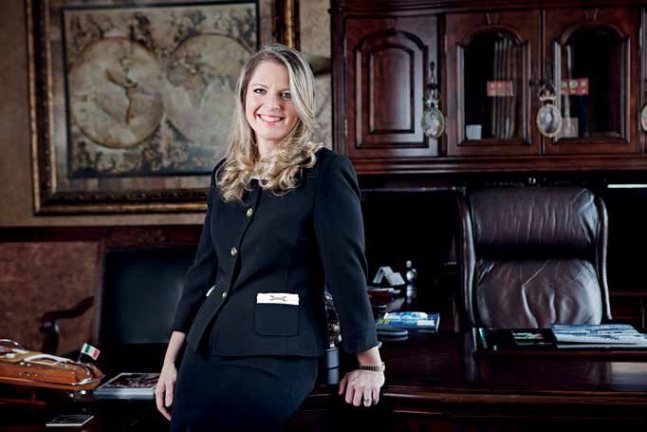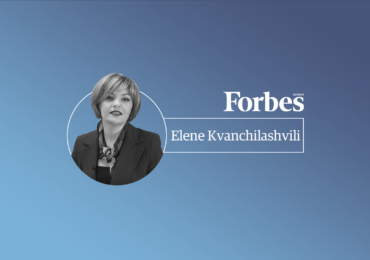The Economic success of Georgia requires more ‘green currency.’ Foreign investors expect an attractive business environment from a country that is known for its prestigious hospitality. Where exactly are the ‘STOP’ signs that hinder the economic development of the country? Sarah Williamson discusses the potential of the local market in an interview with Forbes Georgia. The UGT vice president sees a way to prevent ‘economic traffic’ by nullifying legal barriers.
Your duty as the president of the American Chamber of Commerce is to establish business relations between Georgia and the United States. What are the guiding principles that bring countries that are 10,000 km away closer together?
The large distance creates the biggest obstacle when it comes to relations between the two countries. We have a long way to go when it comes to telling Americans about the unbelievable success that Georgians have achieved over the last decade. An open market and democratic society is the reality in Georgia today. Also, I want to emphasize the value of the country as a regional hub. Investors must see that the Georgian market goes beyond local borders, and can be discussed in a larger, regional context. The major point is to bring potential investors to Georgia. We talk a lot about the simplicity of doing business on the local market, the favorable tax regime, the reform-oriented government, and Georgia’s western commitment. But it is impossible to convey everything through presentations and speeches. Georgia is so much more attractive close-up.
You have been the president of the American Chamber of Commerce in Georgia for four years. During this period, which American companies have entered the market with your support?
Many western companies contact us. The American Chamber of Commerce introduces them to the Georgian market. We do everything in our power to represent the best potential of the local market. However, companies make decisions independently; we do not consider any of it to be our personal achievement. But the American Chamber of Commerce is trying hard to attract investors to come to Georgia. For instance, last spring with the support of the US State Department, the Commercial Department, as well as the American Chamber of Commerce in cooperation with various Turkish representatives, we invited a delegation of American companies. DOW Chemicals led the largest group of business visitors. We introduced the future prospects of the Georgian market to the companies that have already invested in Turkey. We are still negotiating with the delegation members. This year, we are hosting the film industry trade mission.
Can you think of specific cases, when the government took your advice into account?
The government is always ready to cooperate. Our relationship is not limited to either accepting or rejecting our advice. We were actively involved in working on labor law, and we contributed a significant amount of time and work to simplifying visa regulations for entering Georgia. Thanks to the joint efforts of the American Chamber of Commerce, and the Ministry of Economy and Sustainable Development of Georgia, we have established a facilitated regime and a welcoming environment for foreigners. In cooperation with the Investors Council, and the Association of Law Firms of Georgia, we rewrote the law, so it prevents the government from freezing a company’s accounts without a court decision. This is something we have been demanding from the government over the years. The Prime Minister was supportive of this project, and we are going through the final phase of the project together with the Ministry of Economy and Sustainable Development of Georgia and the Ministry of Justice of Georgia. At the moment, we are working on the Estonian tax regulation model. Mr. Kvirikashvili understands the challenges we are facing, and we are working effectively together to find solutions.
Which legal regulations have made investors hesitant to commit to certain projects in Georgia?
It’s quite difficult to say what exactly the reason was. I cannot speak about specific cases, but there were some negative factors, such as legislation that restricted foreign citizens from purchasing agricultural land in the country, as well as the introduction of the new visa regime, and cases where a company’s accounts were frozen without a court order.
What should Georgia do to become more attractive to foreign investors?
There’s a lot more that can be done to attract investors. Of course, there is no magic recipe for this. However, business development, improved tax administration, rule of law issues, stability, and the predictability of legislative policy – all these factors combine to create an attractive investment climate.
What is Georgia’s position in the region, and what are the prospects for the country on the international markets?
Georgia has achieved amazing success on a regional scale. The national currency exchange rate is unfavorable, but compared to the currency of Georgia’s neighbors, the Georgian Lari has remained relatively stable. The country’s economy is slowly but steadily increasing, foreign direct investment inflows seem impressive. The Georgian population has many problems to deal with, but with the recovery of the world economy, Georgia has a number of prerequisites for progress, such as access to the EU market, an improved situation in the region, and a great potential for investment from the West, Iran, and China.
Is Georgia ready to meet the Western standards set by the Europe’s Deep and Comprehensive Free Trade Agreement?
Today Georgia is not ready, but a deep and comprehensive free trade agreement with Europe provides for this challenge. I believe, in the long run, the trade agreement will bring economic and political benefits to the country. Everyone should understand that this process is related to cost increase, so it is necessary to inform the population about the possibilities of entering new markets and introducing new standards. Georgia should consider carefully how to introduce regulations. They should not be pushed excessively in a short period time. It is crucially important to be consistent. The country’s economy is still very fragile, and compared to the other European markets, requires more openness. The European Union and the United States support Georgia in confronting these challenges.
A free trade agreement with the United States had been considered over the years. Can we expect to successfully complete the process in the near future, and what kind of inhibiting factors are we dealing with?
Unfortunately, a free trade agreement with the United States will not be considered in the near future. Georgia is doing everything it can to achieve progress, but at this point, The US’s trade mission focuses on trade agreements with the European Union and Asian countries. Active dialogue with US trade official is still underway. It will only be possible to consider the case of Georgia after the end of these discussions. I think that a deep and comprehensive free trade agreement with the European Union will also benefit the relations between the United States and Georgia.
The political situation in Georgia in the upcoming election is becoming increasingly tense. How could the election year affect investors?
Unfortunately, the reality is that everybody is cautious during the election year – especially in developing countries. Compared to 2012, the situation is stable. We hope that a quiet environment will be maintained. Georgia is ripe for decent elections. Other turns of events will only damage the country.
You and your Georgian husband have established an information technology company in Georgia, when this field was entirely a novelty. How did the local business environment work in UGT-’s case?
UGT is an information technology company. We were young, and this field, which was totally unfamiliar to the Georgian market, was very attractive to us. George had just graduated from Oxford University, and he is also a graduate of Tbilisi State University. He’s an astrophysicist. I had a high-paying job and a successful career in the United States at that time, but we decided to take risks and start a business in Georgia. That’s how we became entrepreneurs. In order to survive in the modern world, Georgia needed rapid development. We had to handle this difficult challenge. We were fortunate, because the old generation – the so-called ‘old army’ of the Shevardnadze regime –did not know anything about this sector, and we stayed unnoticed by them. That is why, unlike other companies, we were lucky to avoid problems with the government. I can say that we were under the radar until we grew to the point where we could defend ourselves. Despite the challenges, we managed to keep the image of company with Western values. In the beginning, we had few computers and ten people working. Today, UGT has 350 employees. We started with a five-year business plan, which has turned out to be successful. The company’s annual growth has been impressive. We are still working on this principle; we set up a new strategy every five years.
With regard to some internal challenges, how did you manage to find professional IT personnel?
Georgians are intelligent and talented, they learn quickly. During the 90s, when we started the business, there was a strong influence of communism, and it was extremely difficult to find qualified staff in the fields of technology, business ethics, sales, marketing and customer service. Over the years, together with our partners, we invested in training courses and the professional development of our employees. This problem does not only affect the IT sector, human resources also remains a problem on the local labor market.
The president of UGT is your husband. What are the pros and cons of the family business?
In our case it works well. But I cannot speak for everyone. We are partners at every stage, and in every aspect of our lives. We never take a superior attitude towards each other. The only downside may be that we often continue talking about work at home. Debate about UGT, the American Chamber of Commerce or any business issue during a family dinner is definitely not what our children like. So usually they quickly stop us. My husband and I do not have severe reactions, we try to respond to our children’s anger with humor.
Given the tight schedule, how do you find time for family?
It’s very difficult. However, running our own business gives us the advantage of working flexible schedules. I try to return home in the evening around five or six o’clock, and spend time with my children. This means that I continue working after they are asleep. Of course, all decisions we make are in the interests of the children first of all. I believe in the benefits of family holidays. We are working very hard to find time to take care of our children.
What is the most important for you and your family in Georgia?
Georgia is our home. We love this country – the mountains and sea resorts are equally available in Georgia, which is a very pleasant fact. We love Georgians and the expats who prefer to live in Georgia. A lot of educated, interesting, and adventurous people live in this country. I am proud that I am their friend. I have been living in Georgia for over 18 years, and leaving this country is not included in my plans.












